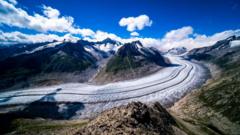A comprehensive study has found that glaciers are melting faster than ever recorded, losing 6,500 billion tonnes of ice this century alone. This trend poses serious threats to freshwater supplies and increases sea-levels, highlighting the urgent need for climate action.
Glaciers Under Siege: Unprecedented Melting Triggers Global Water Crisis

Glaciers Under Siege: Unprecedented Melting Triggers Global Water Crisis
A new study reveals alarming rates of glacier retreat worldwide, raising concerns about freshwater resources and global sea-level rise.
The world's glaciers are facing an alarming rate of melt as climate change accelerates, according to the latest extensive scientific analysis. The findings reveal that glaciers, which serve as a crucial freshwater supply for millions globally, have lost over 6,500 billion tonnes of ice, amounting to approximately 5% of their total mass since the beginning of the century. This loss is particularly alarming as glaciers are a pivotal component in maintaining available freshwater and act as natural reservoirs that mitigate droughts.
Aletsch Glacier, the largest in the European Alps, exemplifies this crisis, having receded nearly 3.2 kilometers since 1900, with over 1 kilometer lost since 2000 alone. Furthermore, the research indicates that the rate of glacier melting has accelerated; icy losses in the last decade have been over a third greater than during the early 2000s. The study synthesizes over 230 regional estimates from 35 research teams, bolstering confidence in projections about future glacier behavior.
Typically in a stable environment, glaciers balance their ice gain through snowfall with their ice loss from melting. However, increasingly rising temperatures due to human-induced climate change have disrupted this equilibrium. On average, glaciers outside the vast ice sheets of Greenland and Antarctica alone have shed about 270 billion tonnes of ice each year since 2000. This staggering figure equates to the water consumption requirements of the global population over a 30-year span, according to Michael Zemp, director of the World Glacier Monitoring Service.
Distinct regional changes are apparent; for instance, Central Europe now faces a 39% reduction in glacier ice over the last two decades. The article points out that the value of this study lies less in its confirmation of existing beliefs about glacier melting and more in the comprehensive data it collates from diverse methodologies, including satellite data and ground measurements.
The scientists stress the visible need for decisive climate action, as glaciers have decades to respond to climate changes. The projected ice loss by the century’s end heavily depends on global carbon emissions and temperature increases. If contemporary climate targets are met, loss may be capped at a quarter of the world's glacier ice; however, uncontrolled warming could result in a nearly 50% melt.
Prof. Zemp warns that even the modest prevention of temperature rises could save significant ice masses and mitigate severe effects on millions relying on glacier melt for freshwater—overshadowing local ecological impacts. Every centimeter of sea-level rise jeopardizes the populations of 2 million more individuals, contributing to more frequent coastal floods and risking extensive displacement. The study underscores that global sea levels have risen over 20 centimeters since 1900, with projections indicating faster increases in upcoming decades.
In conclusion, the relentless decline of glaciers heralds a broader crisis that will resonate far beyond local ecosystems, potentially destabilizing water supply chains and exacerbating global flooding risks. The urgency for responsible climate action resonates louder than ever, as the world's glaciers serve not just as picturesque wonders but as vital components of our water and climate systems.



















